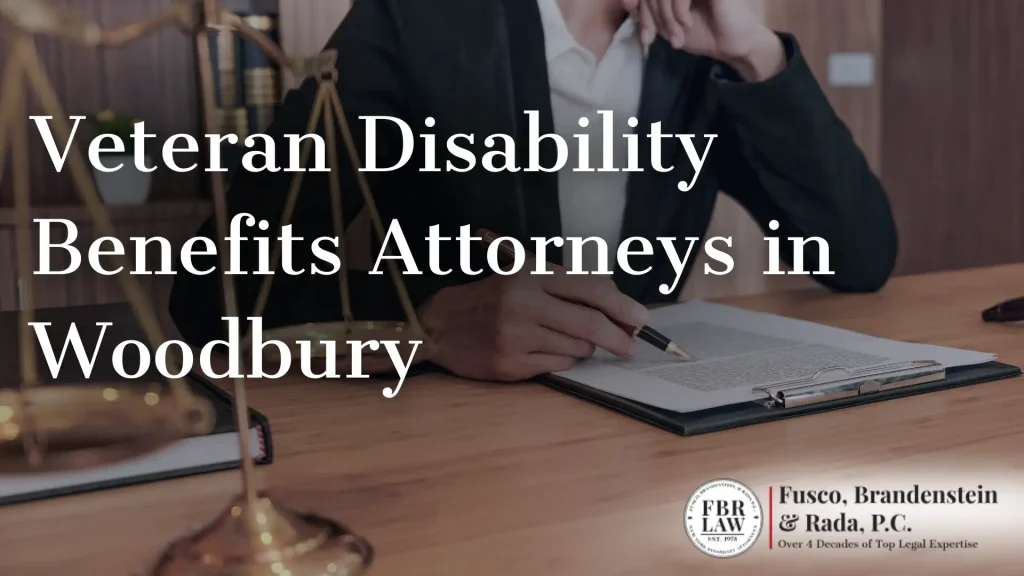
If you are a veteran in Woodbury dealing with the VA disability process, you are not alone, and you don’t have to do it by yourself. Fusco, Brandenstein & Rada, P.C. is a specialized veterans benefits law firm with a long history of serving veterans and military personnel. A veterans benefits attorney in Woodbury from our firm is a dedicated advocates who represent veterans in their claims, and our mission is to provide personalized service to all our clients. You can expect a high standard of legal support and reliable results when you work with our law firm.
Our attorney’s career has been focused on helping veterans secure the benefits they deserve. We encourage veterans to hire experienced legal help to navigate the VA disability process and maximize their chances of success. We have guided veterans through every part of the process and know how to cut through the red tape. Reach out through our contact page or call 516-496-0400 to schedule a consultation with a Woodbury disability attorney and see how we can support you.
What Are VA Disability Benefits?
VA disability benefits are a tax-free monthly payment program for veterans with injuries or health issues tied to their military service, administered by the Department of Veterans Affairs. Veterans are entitled to these benefits as recognition of their service, and they deserve the support these benefits provide. The amount you get depends on your disability rating, which the Department of Veterans Affairs assigns in 10% increments from 0% to 100%. Higher ratings mean your condition significantly impacts your daily life or ability to work, which leads to more compensation and helps pay for living expenses.
If you have more than one service-connected condition, the Department of Veterans Affairs doesn’t just add the ratings together—they use a combined ratings formula, which can be confusing. The VA’s website fully explains how it works and the current payment rates.
If you have dependents, such as a spouse, parents, or children, you may be eligible for increased benefits to help support your family. Common qualifying conditions include PTSD, traumatic brain injuries, back or joint pain, hearing loss, tinnitus, sleep apnea, migraines, and respiratory issues. The Department of Veterans Affairs also recognizes conditions linked to toxic exposure, such as illnesses from Agent Orange, burn pits, or contaminated water at Camp Lejeune. This isn’t a complete list, but if your condition is connected to your time in service, it’s worth seeing if you qualify. The right disability rating can make a real difference in your monthly support. Handling veterans affairs can be complex, but understanding your entitlements ensures you receive the benefits you deserve.
Read more: What You Need to Know About Your Veterans Disability Benefits Claim
Who Is Eligible for VA Disability Compensation?
To qualify for VA disability benefits, members of the armed forces must meet three main requirements. First, you must have served on active duty, active duty for training, or inactive duty training in a branch such as the army, air force, navy, or marines. Second, you need to have a current diagnosed medical or mental health condition. Third, and probably the trickiest part, there has to be a link between that condition and your military service.
That service connection can take a few forms. It might be direct, meaning the condition started while you were in the service. It could also be secondary, meaning it’s caused by another condition that’s already service-connected. Or, it might be an aggravated condition—something you had before service that got worse because of it.
The VA, as a government agency, also has what’s called “presumptive conditions.” These are specific conditions automatically assumed to be connected to service if you were in certain places or served during particular time periods. For instance, if you were in Vietnam and exposed to Agent Orange, the VA presumes a connection for things like diabetes, Hodgkin’s disease, or ischemic heart disease. You don’t have to prove the connection in those cases, which can make things a lot easier.
Claims can also be filed on behalf of veterans by authorized representatives, such as a Veterans Service Organization (VSO), to help navigate the process.
Understanding the Disability Ratings and Compensation
Each service-connected condition is rated using the VA’s Schedule for Rating Disabilities, which looks at your symptoms, how the condition limits your daily life, and how it affects your ability to work. A 0% rating means the VA agrees your condition is connected to your service, but they don’t think it impacts your ability to function or hold a job—so there’s no monthly compensation. A 100% rating means you’re considered totally disabled and qualify for the highest monthly benefit.
There’s also something called TDIU, or Total Disability based on Individual Unemployability. That could apply if you can’t keep steady work because of your service-connected conditions, even if your total rating is under 100%. On top of that, the VA updates compensation rates every year, and your monthly payment can increase if you have qualified dependents like a spouse, kids, or dependent parents.
Disability Rating Increases and Worsening Conditions
If your condition has worsened since the VA’s last decision about your level of impairment, you can ask for a rating increase—but you’ll need to back it up. That means submitting updated medical records, doctor’s notes, and info about how your symptoms affect your daily life. Don’t wait around hoping the VA will review your file on its own—they won’t. You have to be the one to push for it if you want your benefits to match what you’re dealing with now.
Common Reasons for VA Claim Denials
VA claim denials usually come down to paperwork problems or not enough solid evidence. Some of the most common reasons for denial include no clear link between your condition and your service, missing or thin medical records, mistakes or missing info on forms, problems with your Compensation and Pension (C&P) exam (like missing it or not giving enough detail), or the VA deciding your condition doesn’t meet their criteria. Our attorneys know how to dig into the details, fix what’s missing, and build your case the right way so it gives the VA all they are looking for, using the extensive resources our firm has to support your claim.
What to Do After a VA Claim Denial
A denial is not the end of the road. You have several appeal options, but each comes with deadlines, rules, and strategic considerations.
- Supplemental Claim: Submit new evidence not considered in the original decision.
- Higher-Level Review: Ask for a more experienced VA reviewer to look at your case without adding new evidence.
- Board Appeal: File directly to the Board of Veterans’ Appeals and choose between a direct review, evidence submission, or a hearing.
In most cases, you have one year from the date on your decision letter to file your appeal. Missing a deadline could mean losing months or years of potential retroactive benefits.
How Our Veterans Disability Lawyers in Woodbury Help
Our legal team supports veterans throughout the claims and appeals process, offering clear guidance at every stage. Here’s how our Woodbury veterans benefits attorneys can help:
- Initial Claims: We’ll assist with gathering service records, medical evidence, and lay statements to establish a strong claim from the beginning.
- C&P Exam Preparation: We’ll help you prepare for your C&P exam, which is a key part of the VA’s evaluation.
- Rating Increases: If your service-connected condition has worsened, we’ll build a case for a higher rating.
- TDIU Claims: We support veterans who cannot maintain substantially gainful employment due to their disabilities.
- Appeals: If you have been denied, we’ll review your VA decision letter, identify gaps or errors, and file appeals through:
- Supplemental claims (with new and relevant evidence)
- Higher-level reviews (a senior VA reviewer re-examines the claim)
- Board of Veterans’ Appeals (hearings before a Veterans Law Judge)
Our team can also work with independent medical professionals who can provide credible, VA-compliant nexus letters and exams.
Why Veterans Trust Fusco, Brandenstein & Rada, P.C. in Woodbury
We’re proud to help veterans across Long Island and New York who are dealing with the VA system. You’re not just a case number to us—we take the time to understand what you’ve been through and what you need. We’ve been handling VA disability claims for decades, and we know how frustrating and confusing the process can be. That’s why we’re here to make things easier and fight for the benefits you’ve earned.
What sets us apart? Our lead attorney is a graduate of the University of Minnesota Law School, bringing a strong educational background and expertise in veterans law. We know the ins and outs of VA law and work with a solid network of medical professionals to help build strong cases. Every client gets personal, hands-on support that actually fits their situation—not some cookie-cutter strategy. We keep you updated, respond quickly, and handle the VA side of things so you can focus on your health and your family. See what people are saying about working with our team.
Frequently Asked Questions About VA Disability Benefits
If you are handling the VA disability process, you probably have questions about timelines, working while on benefits, or how attorneys get paid. Our veterans benefits lawyer in Woodbury answers your questions below:
How long does the VA take to decide on a claim?
Initial claims typically take 4-6 months. Appeals may take 12 months or longer, especially if they go to the Board of Veterans’ Appeals.
Can I work while receiving VA benefits?
Yes, you can work and still receive VA disability benefits. However, if you are applying for TDIU, your employment status becomes a key factor. You must show that you cannot maintain substantial employment due to service-connected conditions.
Can I get benefits if my condition develops years after service?
Yes. Many conditions, especially those related to toxic exposure or mental health, appear or worsen years later. You need a strong medical opinion linking your current diagnosis to your service or another service-connected condition.
How do lawyers charge for VA claims?
Attorneys typically work on contingency for VA cases, meaning no upfront fees. The VA caps fees for appeals at 20% of any past-due benefits awarded.
Is a rating increase the same as a new claim?
No. A rating increase applies to an already service-connected condition that is worsened. A new claim is filed for a different condition not yet linked to your service.
Understanding these key points can make the process feel a little less overwhelming—and help you make informed decisions along the way.
Connect With a VA Disability Attorney in Woodbury
You have already sacrificed for your country—now it is time to take care of yourself. Whether you are applying for benefits, appealing a decision, or seeking a rating increase, having the right legal help can make all the difference. Our Woodbury veterans benefits lawyer can help.
Call Fusco, Brandenstein & Rada, P.C. at 516-496-0400 today to contact and speak with a veterans disability lawyer in Woodbury. Let our team of attorneys help you move forward with confidence and peace of mind. Planning a visit? Find our office easily on Google Maps.
